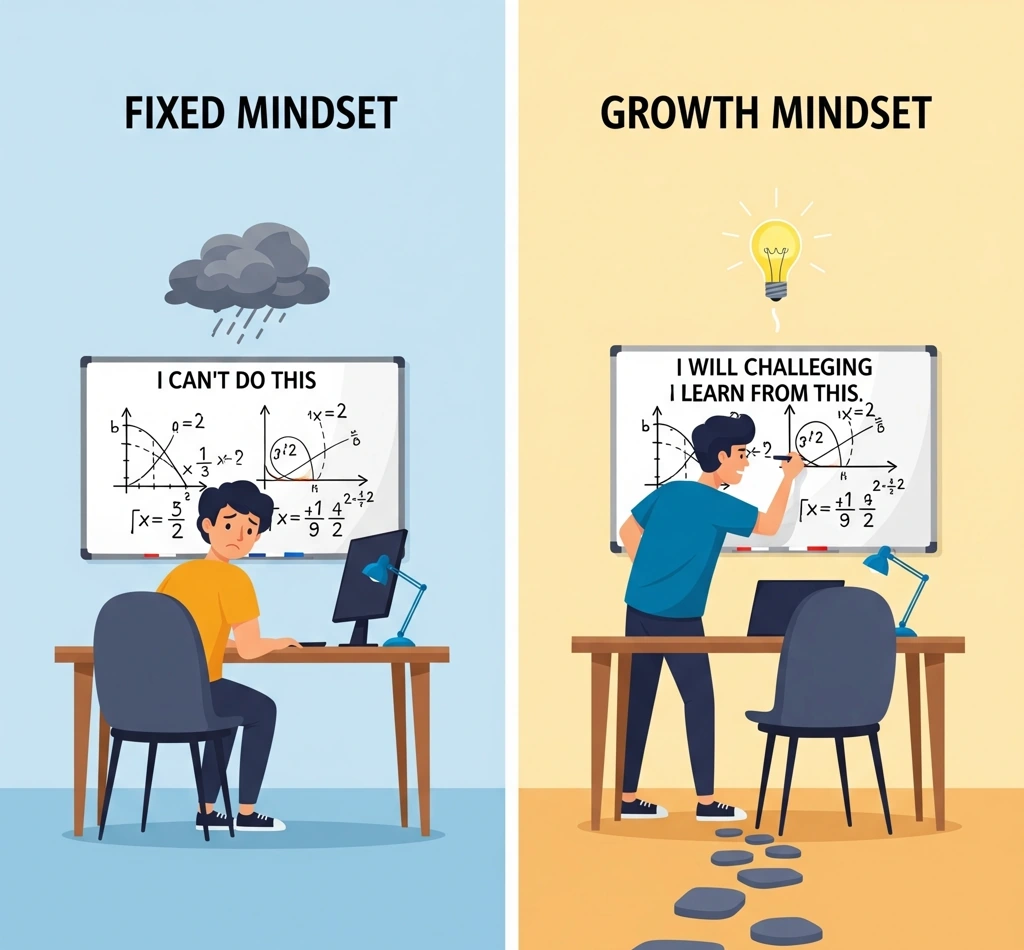Understanding Mindsets
Fixed Mindset A fixed mindset is the belief that intelligence, talents, and abilities are static traits that cannot be changed. People with a fixed mindset often believe that their abilities are innate gifts and that effort plays a minimal role in their success. They tend to avoid challenges, give up easily when faced with obstacles, and feel threatened by the success of others.
Growth Mindset A growth mindset, on the other hand, is the belief that intelligence, talents, and abilities can be developed through effort, learning, and perseverance. Individuals with a growth mindset view challenges as opportunities to grow, persist in the face of setbacks, and find inspiration in others' success. They believe that effort is a crucial path to mastery and that anyone can improve with dedication and hard work.

Impact on Learning and Development
Academic Success Students with a growth mindset are more likely to embrace challenges and persist through difficulties, leading to better academic performance. They see effort as a path to learning and are more likely to seek out help and feedback, which enhances their understanding and skills. Conversely, students with a fixed mindset may avoid challenging tasks and be less resilient when faced with academic setbacks, limiting their learning potential.
Professional Success In the workplace, a growth mindset can lead to greater career advancement and job satisfaction. Employees who believe in their ability to develop new skills are more likely to take on new challenges, seek out professional development opportunities, and adapt to changing circumstances. This adaptability makes them valuable assets to their organizations. In contrast, those with a fixed mindset may resist change and be less likely to innovate or take risks, hindering their career growth.
Changing Your Mindset
Awareness and Self-Reflection The first step in changing your mindset is becoming aware of your current beliefs and attitudes. Reflect on how you respond to challenges, criticism, and the success of others. Recognizing fixed mindset thoughts is crucial for shifting towards a growth mindset.
Embrace Challenges Start viewing challenges as opportunities to learn and grow. Instead of avoiding difficult tasks, approach them with curiosity and a willingness to put in the effort. Embrace the process of learning rather than focusing solely on the outcome.
Learn from Criticism and Feedback Constructive criticism is a valuable tool for improvement. Rather than feeling defensive, use feedback to identify areas for growth. Understand that mistakes are part of the learning process and an opportunity to develop new strategies.
Celebrate Effort and Progress Shift your focus from innate talent to the effort and progress you make. Celebrate small wins and recognize the hard work you put into achieving them. This reinforces the belief that effort leads to improvement.
Mindset in Different Contexts
Education In educational settings, promoting a growth mindset can enhance student engagement and achievement. Teachers can foster this mindset by praising effort rather than innate ability, encouraging students to take on challenging tasks, and providing constructive feedback. Schools that implement growth mindset principles see increased student motivation and resilience.
Sports Athletes with a growth mindset are more likely to put in the necessary practice and effort to improve their skills. They view setbacks as part of the journey to success and are more likely to persist in their training. Coaches can cultivate a growth mindset by focusing on the process of improvement and emphasizing effort over innate talent.
Business In the business world, a growth mindset can drive innovation and adaptability. Companies that encourage employees to take risks, learn from failures, and continuously seek improvement are often more successful in navigating change and achieving long-term success. Leaders with a growth mindset can inspire their teams to embrace challenges and pursue excellence.
Examples and Studies
Carol Dweck’s Research Carol Dweck, a pioneering psychologist in mindset theory, has conducted extensive research demonstrating the impact of mindsets on achievement. In her studies, Dweck found that students who were taught that intelligence is malleable and can be developed through effort performed better academically. These students were more motivated to learn, persisted through challenges, and ultimately achieved higher levels of success.
Practical Applications
- Educational Interventions: Programs that teach students about the growth mindset and how to apply it in their learning have shown significant improvements in student performance and motivation. For example, schools that incorporate growth mindset workshops and curricula see increased student engagement and higher academic outcomes.
- Corporate Training: Companies that implement growth mindset training for their employees report higher levels of innovation, collaboration, and job satisfaction. These organizations create cultures where continuous learning and improvement are valued, leading to enhanced business performance.
Influence on Habits and Identity
Creating Positive Habits A growth mindset facilitates the creation of positive habits. When individuals believe they can improve through effort, they are more likely to adopt habits that support their goals. For example, someone with a growth mindset aiming to become fit will be more consistent in their exercise routine, as they see each workout as a step towards improvement.
Shaping Identity Adopting a growth mindset can lead to a shift in identity. For instance, when you start identifying as a lifelong learner or a resilient person, your actions will align with this new self-concept. This identity change reinforces the habits necessary for achieving your goals, creating a virtuous cycle of growth and development.
Conclusion
The power of mindset cannot be overstated. Embracing a growth mindset can transform how you approach challenges, learn from experiences, and achieve success. By understanding the key characteristics of fixed and growth mindsets, recognizing their impact on learning and development, and applying strategies to foster a growth mindset, you can unlock your full potential. Whether in education, sports, or business, the principles of a growth mindset can lead to significant personal and professional growth. Embrace the power of mindset and watch as it transforms your habits, identity, and achievements.